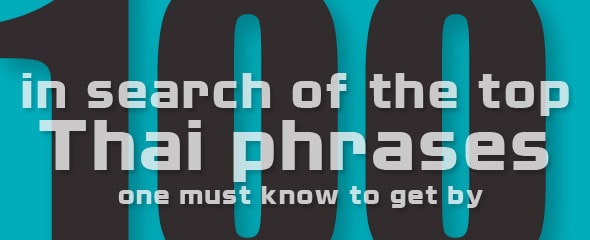Este artículo toma aproximadamente 14 minutos minutos en leerse. ¿No tienes tiempo ahora? No hay problema. Envíate la versión sin anuncios por correo y léelo después.
This article was originally posted on WomenLearnThai.com.

Compilando una lista de vocabulario tailandés de las 100 palabras principales a partir de frases…
Buscando una lista de vocabulario tailandés de las 100 palabras principales para usar con el Método de loci ¡ha capturado completamente mi interés! Desde que comencé esta aventura, he encontrado muchas maneras de compilar tal lista y ahora estoy en la versión tres. O cuatro.
En los comentarios de Compilando una lista de vocabulario tailandés de las 100 palabras principales, el consenso fue crear un artículo dedicado a las principales frases tailandesas y luego crear una lista de vocabulario tailandés de las 100 palabras principales desde allí. Es una buena idea (y mis disculpas por haber tardado tanto). No queriendo llegar a la fiesta sin preparación, yo busqué frases en tailandés, acorté las frases para que fueran adecuadas para principiantes, conté las palabras tailandesas usadas, y luego añadí más palabras and frases.
Durante la selección, tuve en cuenta la posibilidad de usar aplicaciones de iPhone/smartphone con imágenes y/o libros de frases en versión física con imágenes, y una calculadora (ya sea en tu teléfono o colgando de un llavero). Los libros de frases fueron revisados el año pasado aquí: Libros de frases con imágenes: Para cuando no pueden hablar tailandés. Aún no revisados (pero ya en mis manos) están 3 aplicaciones de iPhone: ICOON en iPhone y iPod Touch, ShowMe y Show it!
También elegí palabras que, al combinarse, formarían nuevas palabras, aumentando la lista de palabras trabajadas pero no en el conteo original de 100. Y donde una palabra básica sería suficiente, evité añadir otra. ¡Todavía no estoy seguro si tomé la mejor decisión con เอา /ao/ y รับ /ráp/!
También intenté prescindir de palabras entendidas internacionalmente como Thai (ไทย /tai/) para idioma tailandés o Tailandia, taxi (แท็กซี่ /táek-sêe/) y OK (โอเค /oh-kay/). Pero la mayoría están incluidas en las frases.
Oh. Y omití (algunas) palabras cubiertas por señas entendidas internacionalmente (imitar una llamada telefónica es un buen ejemplo).
Lista de vocabulario: Las 100 palabras tailandesas principales a partir de frases…
Así que aquí tienes, una lista limpia de 100 palabras de las frases tailandesas más básicas. La diferencia entre esta lista y las cien palabras más comunes ampliamente conocidas de Tony Buzan es sorprendente.
Y sinceramente, mirando mi Lista principal de palabras tailandesas creados bajo las restricciones de Buzan me dejaron preguntándome cómo se deben ensamblar las oraciones para una comunicación real. Pero dejaré ese tema para otro post. Prometido.
already (marcador de tiempo): แล้ว /láew/
be [v]: เป็น /bpen/
be at, live at, stay: อยู่ /yòo/
beautiful, attractive, pretty: สวย /sŭay/
big: ใหญ่ /yài/
can: ได้ /dâai/
cannot: ไม่ได้ /mâi-dâai/
come, arrive (muestra dirección hacia el hablante): มา /maa/
delicious: อร่อย /a-ròi/
do, make: ทำ /tam/
doctor: หมอ /mŏr/
don’t!: อย่า! /yàa/
excuse me, I’m sorry: ขอโทษ /kŏr tôht/
expensive: แพง /paeng/
far: ไกล /glai/
fast: เร็ว /reo/
full (food): อิ่ม /ìm/
get, receive, accept: รับ /ráp/
go, leave, depart (muestra dirección alejándose del hablante): ไป /bpai/
good: ดี /dee/
have: มี /mee/
he, she, him, her, they, them: เขา /kăo/
hello, goodbye, see you later: สวัสดี /sà-wàt-dee/
help, aid, assist [v]: ช่วย /chûay/
here: ที่นี่ /têe-nêe/
hot (spicy): เผ็ด /pèt/
hot (temperature): ร้อน /rón/
hotel: โรงแรม /rohng-raem/
how: ยังไง /yang-ngai/
how much, how many: เท่าไหร่ /tâo-rài/
how much, how many: กี่ /gèe/
hungry: หิวข้าว /hĭw kâao/
I, me, my [f]: ฉัน /chăn/
I, me, my [m]: ผม /pŏm/
injured: บาดเจ็บ /bàat jèp/
know (someone, something, someplace): รู้จัก /róo-jàk/
know (something): ทราบ /sâap/ รู้ /róo/
left: ซ้าย /sáai/
like: ชอบ /chôp/
little bit: นิดหน่อย /nít-nòi/
look, see, appear, seem, watch: ดู /doo/
lost: หลงทาง /lŏng taang/
market: ตลาด /dtà-làat/
name: ชื่อ /chêu/
near: ใกล้ /glâi/
no problem, that’s ok, nevermind: ไม่เป็นไร /mâi-bpen-rai/
no, not: ไม่ /mâi/
now, right now, at this moment: ตอนนี้ /dton-née/
stop, park: จอด /jòt/
one more time: อีกที /èek-tee/
person, people, classifier for people: คน /kon/
police: ตำรวจ /dtam-rùat/
P: Polite particle [f]: ค่ะ /kâ/
P: Polite particle [m]: ครับ /kráp/
P: Question particle: ไหม /măi/
P: Question particle [f]: คะ /ká/
P: Question, confirmative [m/f]: เหรอ or หรือ /rĕr or rĕu/
P: Question, “what about …?”: ล่ะ /lâ/
P: Softener, makes it more persuasive: นะ /ná/
P: Softens request or command, a bit: หน่อย /nòi/
P: Used in requests, congratulations or condolences ด้วย (ค่ะ/นะคะ) /dûay/ (ka/ná-ka)
really: จริงๆ /jing-jing/
restaurant: ร้านอาหาร /ráan aa-hăan/
right: ขวา /kwăa/
slowly, slower: ช้าช้า /cháa-cháa/
speak: พูด /pôot/
stop!: หยุด! /yùt/
straight: ตรงไป /dtrong-bpai/
sure [v]: แน่ใจ /nâe-jai/
Thai currency: บาท /bàat/
thank you: ขอบคุณ /kòp-kun/
that: นั่น /nán/
there: ที่นั่น /têe-nân/
there (further): ที่โน่น /têe-nôhn/
think, calculate: คิด /kít/
thirsty: หิวน้ำ /hĭw-náam/
this, these: นี่ /nêe/
tired: เหนื่อย /nèuay/
to, at, that, which, who, the place, area: ที่ /têe/
today: วันนี้ /wan-née/
toilet: ห้องน้ำ /hông-náam/
tomorrow: พรุ่งนี้ /prûng-née/
turn: เลี้ยว /líeow/
understand: เข้าใจ /kâo-jai/
u-turn: กลับรถ /glàp-rót/
very much, a lot, very: มาก /mâak/
want, take, bring: เอา /ao/ (รับ /ráp/)
want to: อยาก /yàak/
we, us, our: เรา /rao/
well, fine: สบายดี /sà-baai-dee/
what: อะไร /a-rai/
when, whenever: เมื่อไหร่ /mêua-rài/
where (shortened version of ที่ไหน), whichever one: ไหน /năi/
where is: ที่ไหน /têe năi/
who, someone, anyone: ใคร /krai/
why: ทำไม /tam-mai/
write: เขียน /kĭan/
yes: key-word response, ใช่, ครับ, ค่ะ /châi, kráp, kâ/
yesterday: เมื่อวานนี้ /mêua-waan-née/
you: คุณ /kun/
100 palabras no manejan mucho. De esa lista puedes: hacer preguntas, dar respuestas, tener una breve conversación educada, dar instrucciones a un taxista y comprar cosas (principalmente señalando y usando una calculadora).
Y aunque esta lista no te da la estructura básica de las oraciones (como prometen las listas tipo Buzan) pienso que tampoco te dejarán con tantos huecos. Pero qué sé yo. ¡Todavía estoy esperando ser iluminado! Y lo seré. Seguro.
Las frases tailandesas elegidas…
Due to the nature of the project – zero knowledge of Thai – the phrases are as brief as I could make them. Spoken Thai is mostly inferred anyway so a great deal can easily be left out. Two of the most common words to be left out are ผม/ฉัน /pŏm/chăn/ (I) so go easy on me, ok? The polite particles can be thinned out or beefed up too – up to you.
NOTE: This list is just a getting-out-of-the-phrase-gate list. In no way do I consider it final. I didn’t have time to create phrases from everything so I would seriously welcome your help filling it out.
Hello/goodbye/see you later.
สวัสดี /sà-wàt-dee/
How are you?
สบายดีหรือ /sà-baai dee rĕu/
(I’m) fine, thank you.
สบายดี ขอบคุณ ค่ะ/ครับ /sà-baai-dee kòp-kun/
I’m fine, and you?
สบายดี แล้วคุณล่ะ /sà-baai-dee láew kun lâ/
What about you?
แล้วคุณล่ะ /láew kun lâ/
What is your name?
คุณชื่ออะไร /kun chêu a-rai/
My name is ______.
ผม/ฉัน ชื่อ ______ /pŏm/chăn chêu/
Or just plain ‘ole…
ชื่อ _______ /chêu _______ /
Thank you.
ขอบคุณ /kòp-kun/
Thank you very much.
ขอบคุณมาก /kòp-kun mâak/
You’re welcome.
ไม่เป็นไร /mâi-bpen-rai/
What do you want?
รับอะไร คะ/ครับ /ráp a-rai/ [ká/kráp]
Do you want ___?
เอา ___ ไหม /ao ___ măi/
Yes please.
ค่ะ/ครับ ขอบคุณ ค่ะ/ครับ /kâ/kráp kòp-kun kâ/kráp/
Have: มี /mee/
มี /mee/ ____
(I) have a doctor.
มีหมอ /mee mo/
Do you have?
มี ____ ไหม / mee ____ măi/
Do you have a doctor?
มีหมอไหม /mee mŏr măi/
I don’t have a doctor.
ไม่มีหมอ /mâi mee mŏr/
yes: ใช่, ครับ, ค่ะ /châi, kráp, kâ/
no: ไม่ใช่ /mâi-châi/
can: ได้ /dâai/
cannot: ไม่ได้ /mâi-dâai/
Excuse me.
ขอโทษ นะคะ/นะครับ /kŏr tôht ná-kâ/ná-kráp/
I’m sorry.
ขอโทษ /kŏr tôht/
I speak Thai only a little bit.
พูดไทยนิดหน่อย /pôot tai nít-nòi/
Please speak slowly.
พูดช้าช้าหน่อย /pôot cháa-cháa nòi/
OR
ช้าช้าหน่อย /cháa-cháa nòi/
OR
ช้าช้า /cháa-cháa/
slow: ช้า /cháa/
fast: เร็ว /reo/
I don’t understand – I only speak Thai a little.
ไม่เข้าใจ พูดไทยนิดหน่อย /mâi kâo-jai pôot tai nít-nòi/
I don’t understand.
ไม่เข้าใจ /mâi kâo-jai/
I understand.
เข้าใจ /kâo-jai/
Help write (it for me) please.
ช่วยเขียนหน่อย ค่ะ/ครับ /chûay kĭan nòi kâ/kráp/
How do you say it in Thai?
ไทยพูดยังไง /tai pôot yang-ngai/
Repeat it please.
พูดอีกที ค่ะ/ครับ /pôot èek-tee kâ/kráp/
Help!
ช่วยด้วย /chûay dûay/
How: ยังไง /yang-ngai/
v + ยังไง /yang-ngai/
What: อะไร /a-rai/
What? อะไร คะ/ครับ /a-rai ká/kráp/
What happened?
อะไร คะ/ครับ /a-rai ká/kráp/
No, nothing happened.
ไม่ มี อะไร /mâi mee a-rai/
(polite for “none of your business” if asked “what happened?”)
What is this?
นี่อะไร /nêe a-rai/
What is that?
นั่นอะไร /nân a-rai/
What do you want?
รับคะ/ครับ /ráp ká/kráp/
When? เมื่อไหร่ /mêua-rài/
v + เมื่อไหร่ /mêua-rài/
When are you coming?
มาเมื่อไหร่ /maa mêua-rài/
OR
เมื่อไหร่ /mêua-rài/
Today: วันนี้ /wan-née/
Tomorrow พรุ่งนี้ /prûng-née/
Where are you going?
ไปไหน /bpai năi/
(Thai for “hello, how are you doing?”)
ไป _____ /bpai _____ /
Who? ใคร /krai/
n + ใคร /krai/
ใคร /krai/ + verb
Who is that person?
คนนั้นใคร /kon nán krai/
Who does it? Who makes it?
ใครทำ /krai tam/
Who is it?
ใคร คะ/ครับ /krai ká/kráp/
Why?: ทำไม /tam-mai/
How much, how many?: เท่าไหร่ /tâo-rài/, กี่ /gèe/
How many baht?
กี่บาท /gèe bàat/
What’s the matter?
เป็นอะไร /bpen a-rai/
What do you think?
คุณคิดยังไง /kun kít yang-ngai/
Are you sure?
คุณแน่ใจไหม /kun nâe-jai măi/
Is it possible?
เป็นไปได้ไหม /bpen bpai dâai măi/
Is it good?
ดีไหม /dee măi/
What is this?
นี่อะไร /nêe a-rai/
Really?
จริงๆเหรอ /jing jing rĕr/
It’s fine.
ดี /dee/
O.K./All right.
โอเค /oh-kay/
That’s all right, no problem, never mind.
ไม่เป็นไร /mâi-bpen-rai/
I don’t know (something).
ไม่ทราบ /mâi sâap/
ไม่รู้ /mâi róo/
I don’t know (someone, something, someplace).
ไม่รู้จัก /mâi róo-jàk/
Beautiful: สวย /sŭay/
Is it beautiful?
สวยไหม /sŭay măi/
It’s not beautiful.
ไม่สวย /mâi sŭay/
Delicious: อร่อย /a-ròi/
Is it delicious?
อร่อยไหม /a-ròi măii/
It’s not delicious.
ไม่อร่อย /mâi a-ròi/
Wonderful, very good: ดี มาก /dee mâak/
Expensive: แพง /paeng/
Is it expensive?
แพงไหม /paeng măi/
No, not expensive.
ไม่แพง /mâi paeng/
Is it ____?
_____ ไหม /măi/
Hot (temperature): ร้อน /rón/
Hot (spicy): เผ็ด /pèt/
Hot (really spicy): เผ็ดเผ็ด /pèt-pèt/
Not spicy: ไม่ เผ็ด /mâi pèt/
I’m… hungry, thirsty, full, tired, sad…
ฉัน/ผม ___ chăn/pŏm ___
OR
___
Hungry: หิวข้าว /hĭw-kâao/
Thirsty: หิวน้ำ /hĭw-náam/
Full (of food): อิ่ม แล้ว /ìm láew/
Tired: เหนื่อย /nèuay/
Unwell: ไม่ สบาย /mâi sà-baai/
Here: ที่นี่ /têe-nêe/
There: ที่นั่น /têe-nân/
There (further): ที่โน่น /têe-nôhn/
I…
ฉัน/ผม ___ chăn/pŏm ___
Like: ชอบ /chôp/
Don’t like: ไม่ ชอบ /mâi chôp/
Don’t! อย่า! /yàa/
Stop! หยุด! /yùt/
Police! ตำรวจ! /dtam-rùat/
I’ll call the police.
ฉัน/ผม จะบอกตำรวจ! /chăn/pŏm jà bòk dtam-rùat/
Help!
ช่วยด้วย /chûay dûay/
I’m sick.
ฉัน/ผม ไม่สบาย /chăn/pŏm mâi sà-baai/
I’ve been injured.
ฉัน/ผม บาดเจ็บ /chăn/pŏm bàat jèp/
I’m lost.
ฉัน/ผม หลงทาง /chăn/pŏm lŏng taang/
Where is?: ที่ไหน /têe năi/
Where is ___?
n + อยู่ที่ไหน /yòo têe năi/
Where is the toilet?
ห้องน้ำอยู่ที่ไหน /hông-náam yòo têe năi/
Where is the hotel?
โรงแรมอยู่ที่ไหน /rohng-raem yòo têe năi/
Where is the restaurant?
ร้านอาหารอยู่ที่ไหน /ráan aa-hăan yòo têe năi/
Where is the market?
ตลาดอยู่ที่ไหน /dtà-làat yòo têe năi/
How do I get to _____ ?
จะไป _____ อย่างไร /jà-bpai _____ yàang-rai/
Is it far? ไกลไหม /glai măi/
Is it near? ใกล้ไหม /glâi măi/
go straight: ตรงไป /dtrong-bpai/
turn left: เลี้ยวซ้าย /líeow sáai/
turn right: เลี้ยวขวา /líeow kwăa/
u-turn: กลับรถ /glàp-rót/
(or just say U turn (with a Thai accent)
traffic lights: ไฟแดง /fai-daeng/
(I’m) going to _____ (market, hotel, hospital, shopping…)
ไป _____
bpai _____
Stop here please.
จอดที่นี่ ค่ะ/ครับ / jòt têe-nêe kâ/kráp/
Kidding, joking: พูดเล่น! /pôot lên/
Publicaciones en la serie Top 100 Palabras Tailandesas…
Ok, eso es todo por mí. No utilicé todas las palabras porque tengo poco tiempo (y me gustaría hacer otra cosa este sábado por la tarde). Pero me divertí creando oraciones cortas con estas 100 palabras de tailandés.
Dos publicaciones más en la serie:Aprendiendo Idiomas: El arte y la ciencia de recordar todo
Compilando una lista de vocabulario tailandés de las 100 palabras principales








